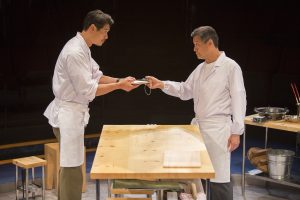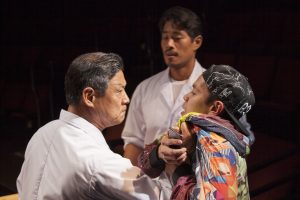Perfection Is the Dream in Old Globe’s ‘tokyo fish story’
How hard can it be to take a slice of fish, wrap it in sticky rice, drizzle it with rice vinegar and serve it as sushi?
Very hard indeed, if the idea is to approach perfection in the form. That’s been the 35-year quest of the master chef in Kimber Lee’s play tokyo fish story, now at the Old Globe Theatre, and it’s beginning to look like he’ll never reach his goal.
The quality of the fish at market is tending downward. Good help is hard to find. Friends are retiring or dying. Regular customers are becoming irregular. And the neighborhood, in Tokyo’s Roppongi Hills district, is described as “dingy and declining.”
Except for the new sushi place across the street, part of a chain. They have a line every day. Why? wonders the chef. At least partly because, explains his son and assistant chef, they offer an appetizer and a dessert with the sushi.
That brings an explosion of frustrated rage, sarcasm and contempt that explains many things and sets the scene for the rest of the drama.
This is a stubborn craftsman who won’t admit the end is nearer than the beginning and that people no longer value his vision of perfection, if they ever did. Sick at heart, the chef retires to his cot so that his staff can finish the exposition.
For years now, the single remaining apprentice has realized that the son will surpass the father, soon if not already. Does the son understand this too? Hard to say, since he’s bound by the rigid laws of filial obedience demanded by his father. To the apprentice he can only declare, “After 35 years in Koji’s place, we do things Koji’s way.”
So the path of the play becomes obvious early, as simple as, well, the recipe for sushi. Change is inevitable, the old must make way for the young and, if each generation does its duty, perfection will come ever nearer.
These rules don’t change even though results stagger, faltering and surging. From King Lear and Der Meistersinger to “Star Wars” and “Game of Thrones,” the storytellers feed the audiences’ fascination.
Nothing is quite so epic in Lee’s play. The day comes, the inevitable happens. Because there is integrity and faith, the future seems promising.
Of more interest is the form of this play, and its staging. The popular stereotype of the Japanese is terse, stoic, polite and delicate and the playwright spreads all that out to see what survives. The verdict? Modern outrages are regrettable but the tradition is strong. The feckless punks with their earbuds and tattoos won’t all survive but enough will.
During the play’s 90 minutes, much sushi is made and the ritual processes become an engaging ballet in snug harmony with the story. Director May Adrales, in association with her designer colleagues, has created a plausible and impressive working kitchen without bulk commodities. No water, no rice, nothing that might spill. There were bits and pieces of what seem to be tuna and rice., some of which are ingested by actors, but there is nothing actually sliced by those formidable knives. The gaps are filled by mime and exquisite sound cues. The effect doesn’t always work but quickly slips into acceptability.
The arena stage of the Globe’s White Theatre isn’t very hospitable to the play but the designers address that. The kitchen dominates the center of Mikiko Suzuki MacAdams’ set and a runway circles it outside the indicated walls. Furniture is minimal, a rack of pots and pans way overhead was not really needed. Jiyoun Chang’s lighting takes care of the details which make this space not only a kitchen but also a restaurant, various streets, a seashore, a riverbank and a memory-scape, all effortlessly.
The dainty sounds and the sturdy music, by Charles Coes and Nathan A. Roberts, are an integral part of the production’s engrossing aura, shaped so knowingly by the director.
James Saito plays the chef with a stony macho which grates at first but eventually morphs into understanding if not warmth. His wrath is sobering to see and he moves as if balancing all tradition on his squared shoulders. Tim Chiou is every bit the son of this formidable father, quite prepared to spend another 20 years of his life in service, shy about the ideas and achievements which he finds accumulating in his mind. When finally, he smiles, clouds fall away.
Raymond Lee as the apprentice is an ideal undecided voter, positioned to understand both the beauty of the road to perfection and the fun of compromise. It’s a more complex role than it seems at first and that’s part of Lee’s achievement. Joe Norman Schneider plays a half-dozen minor roles with all the easy insight necessary.
As the girl who would crash into the men’s world, Tina Chilip is tough, edgy and opportunistic enough to pull it off in the teeth of, “If you cut off a finger and bleed on the fish, you’re done.” She’s less successful as an apparition of a woman from the past but no harm is done.
“You must do what you can with what you have,” is the modest message of this modest play. And even a bit of fish with sticky rice and some vinegar can be unforgettable. If it’s done right.
[box]Continuing in the White Theatre at 7 p.m. Tuesdays, Wednesdays and Sundays; at 8 p.m. Thursdays-Saturdays; and at 2 p.m. Saturdays and Sundays through June 26, 2016.)

Welton Jones has been following entertainment and the arts around for years, writing about them. Thirty-five of those years were spent at the UNION-TRIBUNE, the last decade was with SANDIEGO.COM.




